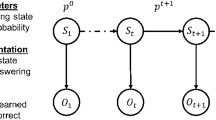Abstract
Short answer question is a common assessment type of teaching and learning. Automatic short answer grading is the task of automatically scoring short natural language responses. Most previous auto-graders mainly rely on target answers given by teachers. However, target answers are not always available. In this paper, a deep autoencoder based algorithm for automatic short answer grading is presented. The proposed algorithm can be built without expressly defining target answers, and learn the lower-dimensional representation of student responses. For the sake of reducing the influence of data imbalance, we introduce the expectation regularization term of label ratio into the model. The experimental results demonstrate the effectiveness of our proposed method.
Access this chapter
Tax calculation will be finalised at checkout
Purchases are for personal use only
Similar content being viewed by others
References
Burrows, S., Gurevych, I., Stein, B.: The eras and trends of automatic short answer grading. Int. J. Artif. Intell. Educ. 25(1), 60–117 (2015)
Sung, K.H., Noh, E.H., Chon, K.H.: Multivariate generalizability analysis of automated scoring for short answer items of social studies in large-scale assessment. Asia Pac. Educ. Rev. 18(3), 425–437 (2017)
Liu, O.L., Rios, J.A., Heilman, M., Gerard, L., Linn, M.C.: Validation of automated scoring of science assessments. J. Res. Sci. Teach. 53(2), 215–233 (2016)
Madnani, N., Burstein, J., Sabatini, J., O’Reilly, T.: Automated scoring of a summary-writing task designed to measure reading comprehension. In: BEA@ NAACL-HLT, pp. 163–168 (2013)
Jimenez, S., Becerra, C.J., Gelbukh, A.F., Bátiz, A.J.D., Mendizábal, A.: Softcardinality: hierarchical text overlap for student response analysis. In: SemEval@ NAACL-HLT, pp. 280–284 (2013)
Dzikovska, M.O., Nielsen, R.D., Brew, C.: Towards effective tutorial feedback for explanation questions: a dataset and baselines. In: Proceedings of the 2012 Conference of the North American Chapter of the Association for Computational Linguistics: Human Language Technologies, pp. 200–210. Association for Computational Linguistics (2012)
Bailey, S., Meurers, D.: Diagnosing meaning errors in short answers to reading comprehension questions. In: Proceedings of the Third Workshop on Innovative Use of NLP for Building Educational Applications, pp. 107–115. Association for Computational Linguistics (2008)
Zesch, T., Levy, O., Gurevych, I., Dagan, I.: UKP-BIU: similarity and entailment metrics for student response analysis, Atlanta, Georgia, USA, p. 285 (2013)
Hou, W.-J., Tsao, J.-H., Li, S.-Y., Chen, L.: Automatic assessment of students’ free-text answers with support vector machines. In: García-Pedrajas, N., Herrera, F., Fyfe, C., Benítez, J.M., Ali, M. (eds.) IEA/AIE 2010. LNCS (LNAI), vol. 6096, pp. 235–243. Springer, Heidelberg (2010). https://doi.org/10.1007/978-3-642-13022-9_24
Zhang, Y., Shah, R., Chi, M.: Deep learning + student modeling + clustering: a recipe for effective automatic short answer grading. In: EDM, pp. 562–567 (2016)
Zhuang, F., Cheng, X., Luo, P., Pan, S.J., He, Q.: Supervised representation learning: transfer learning with deep autoencoders. In: International Conference on Artificial Intelligence, pp. 4119–4125 (2015)
Friedman, J., Hastie, T., Tibshirani, R.: Regularization paths for generalized linear models via coordinate descent. J. Stat. Softw. 33(1), 1–22 (2010)
Yang, X., Zhang, L., Yu, S.: Can short answers to open response questions be auto-graded without a grading rubric? In: André, E., Baker, R., Hu, X., Rodrigo, M.M.T., du Boulay, B. (eds.) AIED 2017. LNCS (LNAI), vol. 10331, pp. 594–597. Springer, Cham (2017). https://doi.org/10.1007/978-3-319-61425-0_72
Mikolov, T., Chen, K., Corrado, G., Dean, J.: Efficient estimation of word representations in vector space. Comput. Sci. (2013)
Acknowledgements
This work is supported by the National Natural Science Foundation of China (No. 61773361, 61473273), the Youth Innovation Promotion Association CAS 2017146, the China Postdoctoral Science Foundation (No. 2017M610054).
Author information
Authors and Affiliations
Corresponding author
Editor information
Editors and Affiliations
Rights and permissions
Copyright information
© 2018 Springer International Publishing AG, part of Springer Nature
About this paper
Cite this paper
Yang, X., Huang, Y., Zhuang, F., Zhang, L., Yu, S. (2018). Automatic Chinese Short Answer Grading with Deep Autoencoder. In: Penstein Rosé, C., et al. Artificial Intelligence in Education. AIED 2018. Lecture Notes in Computer Science(), vol 10948. Springer, Cham. https://doi.org/10.1007/978-3-319-93846-2_75
Download citation
DOI: https://doi.org/10.1007/978-3-319-93846-2_75
Published:
Publisher Name: Springer, Cham
Print ISBN: 978-3-319-93845-5
Online ISBN: 978-3-319-93846-2
eBook Packages: Computer ScienceComputer Science (R0)




